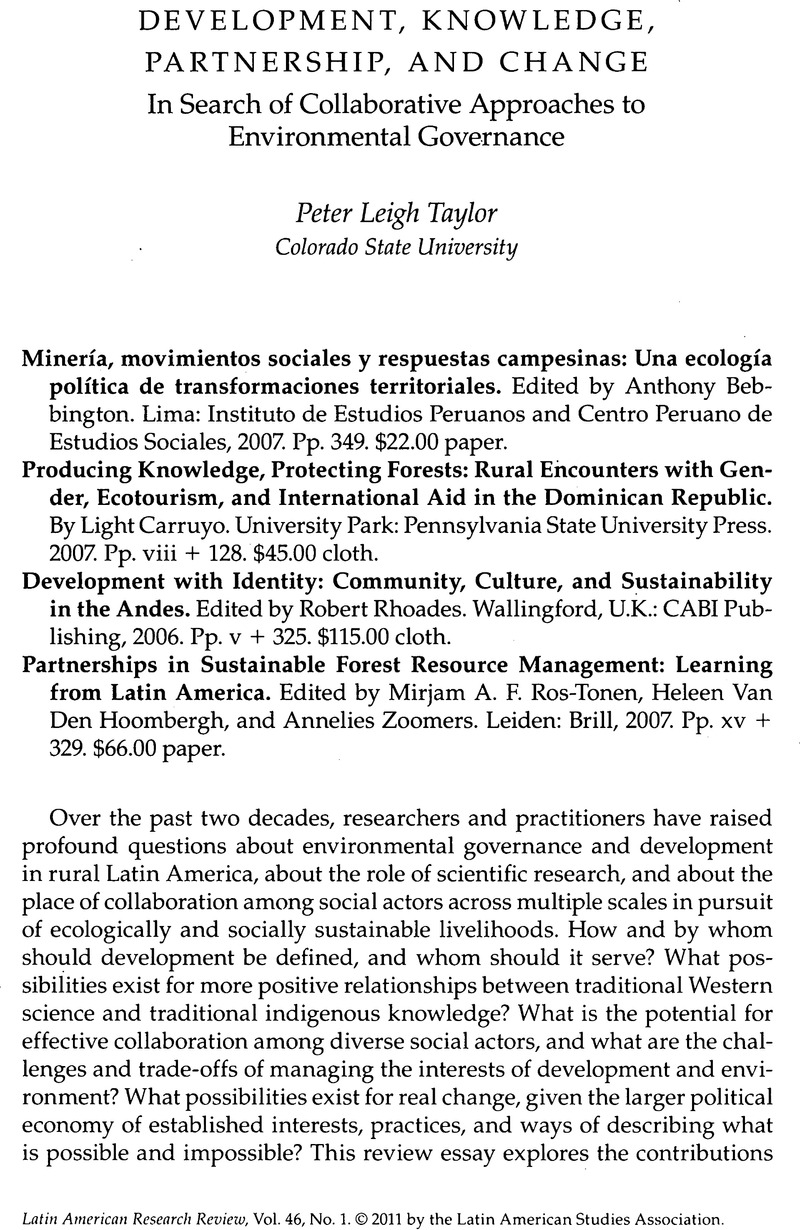Published online by Cambridge University Press: 05 September 2022

1. Peter Cronkleton, Peter Leigh Taylor, Deborah Barry, Samantha Stone-Jovicich, and Marianne Schmink, Environmental Governance and the Emergence of Forest-Based Social Movements (Bogor, Indonesia: Center for International Forestry Research, 2008); Jouni Paavola, “Institutions and Environmental Governance: A Reconceptualization,” Ecological Economics 63 (2006): 93–103.
2. Arturo Escobar, Encountering Development: The Making and Unmaking of the Third World (Princeton, NJ: Princeton University Press, 1995); Saturnino M. Borras, Marc Edelman, and Cristobal Kay, “Transnational Agrarian Movements: Origins, Politics, Campaigns, and Impact,” journal of Agrarian Change 8 (2008): 169–204; Edward Lahiff, Saturnino M. Borras, and Cristobal Kay, “Market-Led Agrarian Reform: Policies, Performance and Prospects,” Third World Quarterly 28 (2007): 1417–1436; Philip McMichael, “Peasants Make Their Own History, but Not Just as They Please,” Agrarian Change 8 (2008): 205–228.
3. Susan Eckstein, “Power and Popular Protest in Latin America,” Power and Popular Protest: Latin American Social Movements, ed. Susan Eckstein (Berkeley: University of California Press, 2001), 1–60; Robert O. O'Brien, Anne Marie Goetz, Jan Aart Scholte, and Marc Williams, Contesting Global Governance: Multilateral Economic Institutions and Global Social Movements (Cambridge: Cambridge University Press, 2000).
4. Gita Sen and Karen Grown, Development, Crisis and Alternative Visions (New York: Monthly Review Press, 1987); Escobar, Encountering Development.
5. James C. Scott. Weapons of the Weak: Everyday Forms of Peasant Resistance (New Haven, CT: Yale University Press, 1985); Escobar, Encountering Development.
6. These pioneers include Robert Chambers, “Participatory Rural Appraisal (PRA): Analysis of Experience,” World Development 22 (1994): 1253–1268; Michael Cernea, ed., Putting People First (Washington, D.C.: World Bank, 1991); Paulo Freire, Pedagogy of the Oppressed (New York: Seabury Press, 1973). Among later works, see Tania Murray Li, “Engaging Simplifications: Community-Based Resource Management, Market Processes and State Agendas in Upland Southeast Asia,” World Development 30 (2002): 265–283.
7. Fikret Berkes, Johan Colding, and Carl Folke, “Rediscovery of Traditional Ecological Knowledge as Adaptive Management,” Ecological Applications 10 (2000): 1251–1262; Marcus Colchester, “Sustaining the Forests: The Community-Based Approach in South and South-East Asia,” Development and Change 25 (1994): 69–100.
8. L. D. Brown, “People-Centred Development and Participatory Research,” Harvard Educational Review 55 (1985): 69–75; Jules N. Pretty, “Participatory Learning for Sustainable Agriculture,” World Development 23 (1995): 1247–1263.
9. Michael Edwards and David Hulme, “Too Close for Comfort? The Impact of Official Aid on Nongovernmental Organizations,” World Development 24 (1996): 961–973; Diana Mitlin, Sam Hickey, and Anthony Bebbington, “Reclaiming Development? NGOs and the Challenge of Alternatives,” World Development 35 (2007): 1699–1720.
10. Brenda Baletti, Tamara M. Johnson, and Wendy Wolford, “‘Late Mobilization’: Transnational Peasant Networks and Grassroots Organizing in Brazil and South Africa,” Journal of Agrarian Change 8 (2008): 290–314; Borras, Edelman, and Kay, “Transnational Agrarian Movements”; McMichael, “Peasants Make Their Own History”; Eckstein, “Power and Popular Protest.”
11. McMichael, “Peasants Make Their Own History”; Susan Healey, “Rural Social Movements and the Prospects for Sustainable Rural Communities: Evidence from Bolivia,” Canadian Journal of Development Studies 26 (2005): 151–173.
12. Manuel Castells, The Power of Identity (Malden, MA: Blackwell, 1997).